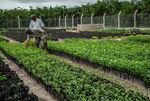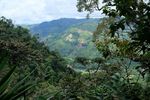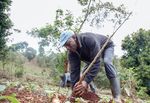TRILLION TREES REFOREST FUND - 2021 REPORT TURNING PLEDGES INTO ACTION
←
→
Page content transcription
If your browser does not render page correctly, please read the page content below
The world is at a crucial moment in defining how we steward
our planet. Trillion Trees believes preserving and restoring forests
is critical to responding to the challenge of climate change.
Trillion Trees
ReForest Fund
2021 Report
Turning pledges into action
Photo © WWFRestoring forests In 2021, the ReForest Fund supported projects
in Kenya, Madagascar and Tanzania.
– for people, At each place, we have built trusting relationships with local communities
nature & climate
and work with them to develop appropriate solutions for all stakeholders.
Support from the ReForest Fund helps these projects expand their efforts
on the ground and increase their scale of ambition: planting more trees,
and restoring more forest. But our portfolio is expanding and we hope to
make more grants to other projects soon.
A quarter of all tropical forests But we’re fighting back. The Trillion Trees
ReForest Fund returns the right trees to the
– about 500 million hectares right places, and in the right way.
– has been lost since 1950. The ReForest Fund supports forest restoration
That’s 20 times the size of the across a portfolio of sites where BirdLife
UK. This loss has been driven International, Wildlife Conservation Society Mount Kenya
Natural forest restoration
and WWF have long-term conservation
by unsustainable demand for programmes.
Community woodlots
commodities such as timber,
Our projects focus on recovering and re-
wood pulp, palm oil, soy, beef, growing natural forests, but we take a
rubber, cocoa, and metals. landscape approach, using a wide range of
methods, and looking for opportunities to
provide livelihoods improvements and
The health of forests that are address the underlying drivers of Coastal Forests, Tanzania
still standing is further deforestation. This ensures our efforts make a Avoided deforestation
Natural forest restoration
lasting contribution to reducing carbon in the
degraded by burning,
atmosphere and preserving critical
fragmentation, and loss of biodiversity.
ecologically critical species of Whether you donate to restore 1 tree or
wildlife. 10,000, your support ensures forests thrive into
the future.
Trillion Trees launched the ReForest Fund in
Makira, Madagascar
2020, and thanks to your support, we made
Natural forest corridors
our first ReForest Fund grants in early 2021. This Community agroforestry
report highlights some of the successes
already achieved. With further support we can bring in more
projects and scale our impact. Please visit
trilliontrees.org/reforest-fund to make a donation.
Vikindu tree nursery. © WWF ReForest Fund October 2021 Report 32021 Projects
Restoring forest and
saving water in Kenya
Project location:
Mount Kenya’s rich natural biodiversity includes 778 Through the Mount Kenya Restoration Strategy 2019- Mount Kenya, central Kenya
plant species, and iconic animals like the African 2029, 6170 hectares were identified as needing Trees planted this year:
elephant, leopard and endangered black rhino. It is immediate restoration. This project is working towards 25,000 indigenous tree
one of the last few east African homes for the bongo that goal. seedlings – 14 native species
(a forest antelope), along with giant forest hogs, Hectares restored this year:
During the spring planting season in March-May 2021,
black-fronted duikers and mole shrews. Its around 40 ha
Nature Kenya was not only able to plant 25,000
cherished birds include rare kinds of starlings, ibis,
seedlings, but also: Local beneficiaries this year:
and the endangered Sharpe’s longclaw. 1,245 (598 men, 647 women)
• Support four Community Forest Associations to
This is also one of the largest water catchments for
maintain restored forest, weeding around replanted
Kenya, providing drinking water for over 2 million
trees and replacing seedlings where necessary.
people. And supporting widespread agriculture,
including coffee and tea plantations, plus important • Carry out bird monitoring in different land use types
hydropower projects and manufacturing. It was to compare natural forest, restored forest, and
recently estimated that the Mount Kenya area provides plantation. The results show that natural forests had
the country with ecosystem services worth around the highest species diversity, with restored natural
$220 million per year. This area has also become one forest second. This monitoring will enable us to track
of the most densely populated parts of Kenya, which the recovery of biodiversity in restored areas.
puts increasing pressure on forest resources. The
Read here about how
Mount Kenya area is home to 28 forest-edge
Paul Gacheru, Nature Kenya
communities. Most of them have fairly low incomes
Programme Manager, is working
and depend on local agriculture, timber for
with communities to restore a
construction, and wood fuel for cooking – all of which
vital watershed in Kenya
impacts on the forests.
Watch the video ‘Nature Matters to All of Us’
Ken ya ReF orest F u n d sites, 2021
Lower I m en ti
Kabaru CFA
Kabaru I ran gi CFA
Kan gaita CFA
F orest
Restoration Sites
Protected Area Bou n dar y
Figure 1. In 2021 Nature Kenya has restored around 40 ha of natural forest at five sites around Mount Kenya, planting 25,000 trees. Photos © Nature Kenya
4 ReForest Fund October 2021 Report Tree planting in Mt. Kenya. Photo © Nature Kenya2021 Projects
Connecting forest
patches in Madagascar
Project location:
Makira Natural Park, The Makira restoration project plants trees and Thirty-six native and lemur-friendly tree species have
Madagascar - Pont Forestier
restores forest in the Makira Natural Park and its been identified for use in ecological restoration. Seeds
Anjanaharibe-Maintimbato
buffer zone. Tree planting in the park contributes to are collected in the park and gown in community
Trees planted this year: the ecological reconstitution of degraded areas, nurseries near restoration sites. Restoration plantings
7,854 – 18 native species
while tree planting in the buffer zone helps to involve members of local communities and WCS staff.
Hectares restored this year: stabilize soil and provide socio-economic benefits Restoration teams continue to maintain newly planted
8.5 ha to buffer zone farming communities. The ReForest sites for up to five years after tree planting, to ensure
Local beneficiaries this year: Fund has enabled restoration to start at a new restoration objectives are achieved. From February to
43 project site. August 2021, the project has been able to not only
plant 7,854 young plants, but
Makira faces a number of challenges including
growing demands for agricultural land for slash-and- • Purchase field materials for restoration teams
burn rice production (tavy), as well as clearing forest (e.g. spades, machetes for clearing invasive
for timber and cash crops. Restoration within the park undergrowth, rakes, watering cans).
focuses on particular forest ‘corridors’ which are
• Establish two new community nurseries and
important to allow forest-dependent species such as
recruit two more tree nursery supervisors from
endangered lemurs, greater freedom to move.
local communities.
Read here about how
Felix Ratelolahy, WCS Technical
Manager, is helping to restore
Madagascar to its former
‘Green Glory’
¯
M adagascar ReF orest F u n d sites, 2021
Pon t F orestier
An jan ah aribe-M ain tim bato
WCS M akira
F iel d Office
F orest
Restoration Sites 2021
0 200
Priority Restoration Areas
Kilometers
Protected Area Boun dar y
Figure 2. In 2021, WCS Madagascar began the restoration of a new forest corridor site. Nearly 8,000 trees have been planted so far this year, with work ongoing to plant 12,000 more.
Photos © WCS Madagascar
The critically endangered black-and-white ruffed lemur ReForest Fund October 2021 Report 7
(Varecia variegata) is found in Makira. Photo © Andrew Kirkby2021 Projects
Restoring degraded
forest in Tanzania
Project location:
These three forests are some of the last remaining This reporting period represents the final stages of this Kazimzumbwi, Pugu and
Vikindu coastal forests, Tanzania
fragments of coastal forests in Kisarawe and multi-year restoration project, which has now reached
Mkuranga Districts, and the area is one of 25 Global its planting goal, but will continue to monitor growth. Trees planted this year:
Biodiversity ‘Hotspots’ due to high species diversity This year, not only were 24,000 seedlings planted, but 24,500 tree seedlings; various
natural species regenerated;
and number of endemic species. Not only are these WWF also
6 native species planted
forests home to extraordinary plant and wildlife, but
• Worked with 124 people from community groups
are incredibly important to the 4 million people Hectares restored this year:
who participated in planting and also benefitted around 24 ha
living in Dar es Salaam and those around the forests.
through paid labour.
They are vital sources of food, water and contribute Local beneficiaries this year:
to the livelihoods of adjacent communities. • Encouraged ecotourism, with an average of 500 124 (70 men, 54 women)
people per month.
Illegal activities and rapid population growth have
affected these forests, with significant degradation • Created jobs for youth tour guides.
occurring over the years due to unsustainable
• Engaged youth through the Foresters of the Future
utilisation of forest resources. The additional challenges
programme, by getting them involved in planting.
of deliberately set fires has impacted some of the
work, and other illegal activities such as pole cutting • Supported the annual Ushoroba festival in Kisarawe
and charcoal making are affecting forest regeneration. District, which promotes ecotourism and conservation.
To restore these forests, WWF has been targeting Read here about how
forest gaps – or areas where trees have been lost – to Azaria Kilimba, WWF Forest
reconnect patches. Focusing on planting native Programme Officer, is pioneering
species and protecting areas planted and already work in community forest
standing, natural regeneration of the forest has conservation in Tanzania
occurred, with an impressive estimate of 2558 stems
Watch an amazing video about the project here
per hectare.
Tan zan ia ReF orest F u n d sites, 2021
Dar es Sal aam
Pugu
Vi k i n d u
K a z i m z u m b wi
F orest
U rban Areas
Restoration Sites 2021
Protected Area Bou n dar y
Figure 3. In 2021, WWF Tanzania worked with communities and youth to plant 24,500 seedlings. Photos © WWF
8 ReForest Fund October 2021 Report Community tree planting in Pugu forest. Photo © WWFThe right trees, Ending deforestation,
in the right places restoring forests
Trillion Trees applies a science- We recognise that restoring forests But there is much more to be done. With your help,
in the right way takes time and money. we will expand our support to more projects restoring
led approach to regrowing the forests and tackling the causes of deforestation in some
right trees in the right places
Trillion Trees partnership
• Native species, locally sourced: of the world’s most biodiverse forest ecosystems. forest conservation work
Future pipeline projects
– and in the right way. Our projects promote natural
regeneration where possible, and source
seeds locally when planting is needed to
This means we prioritise the restore natural forest. We support
restoration of natural forests community groups to establish nurseries
to provide for future plantings.
with native species; we apply
the landscape approach • Consultation and consent:
to address the underlying We choose projects that have long
commitments in landscapes, and have
drivers of forest loss; and we taken the time to develop effective
ensure local people are in partnerships with local community
control of decision making. structures. Our funds help projects to
develop and deepen these relationships.
We aim to always ensure • Monitoring and verification: 1
that our efforts conserve We ask our projects to map their
restoration sites, so that the eligibility of
biodiversity, sustain the land can be independently verified,
ecosystems, and lift people and so that the success of restoration
out of poverty. efforts can be monitored in the future. We
use a custom-built data storage system to
track the progress of our projects.
Peruvian Yungas forest Atlantic Forest, Brazil Bismark Mountains,
This project will recover degraded This project is investing in ‘food
Papua New Guinea
and deforested areas to reduce forests,’ blending the best This project is working with
disaster risks, conserve water economic, environmental and local communities to restore
sources, mitigate climate change, social returns through agroforestry. forest and stabilise soil on steep
and contribute to the recovery of It aims to enhance connectivity slopes, while promoting climate-
emblematic native species. between natural forest fragments, resilient agroforestry techniques.
while ensuring food security and
access to market for farmers.
ReForest Fund October 2021 Report 11Thank you
With your continued support, we can
restore our forests and protect the future
of our planet. For further information
about Trillion Trees and how you can play
a vital role, please contact Jack Lloyd at
action@trilliontrees.org
Or donate directly to the ReForest Fund
trilliontrees.org/reforest-fund
TTRFFYou can also read



























































